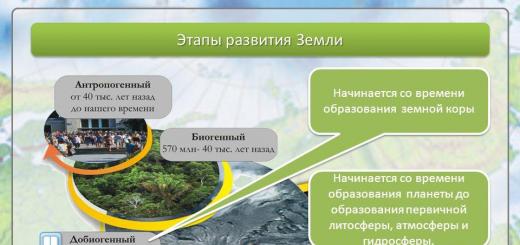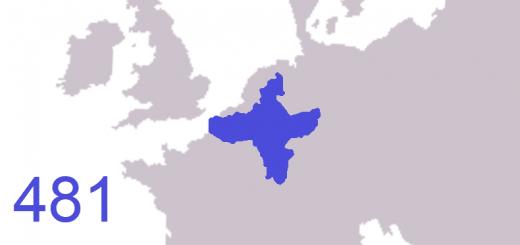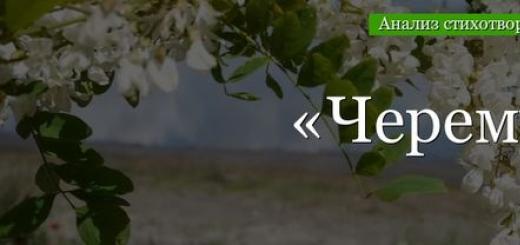Russian dative, more majestic and beautiful than the corresponding forms of other languages, or as if there are more words in the Russian language than in other languages, but only on the fact that the forms and words of the Russian language are the forms and words of the great people of the luminaries of Russian literature, the creators of our amazing for its spiritual power and beauty of culture. - main members, minor members. Attachment, linear and spatial diagrams.
1. Russian language test “Particle. Particle discharges.”1. Specify the particle. 1) on2) for 3) neither 4) over2. Indicate a word that can be not only a particle, butand another part of speech.1) come on2) out3) almost4) hardly 3. Indicate the formative particle.1) really2) let3) already 4) same 4. In which sentence is the highlighted word a formative particle? 1) The trench ended at the very slope of the ravine. (Ananyev A.) 2) Nina Semyonovna sat down on a chair at the very door. (Tendryakov V.) 3) It was huge ship, THE MOST powerful battleship Black Sea Fleet. (Rybakov A.) 4) Shubin burst into the very thick of the battle. (Platov L.) 5. Indicate the semantic (modal) particle expressing intensification.1) what kind of 2) whether 3) exactly4) even6. Indicate the modal particle expressing doubt.1) as 2) only 3) hardly 4) after all 7. Indicate the modal particle expressing limitation.1) all 2) only 3) won 4) -ka 8. Indicate the modal particle expressing clarification .1) hardly 2) just 3) only 4) perhaps 9. In which sentence is the word THIS a demonstrative particle? 1) Tsarev felt that he was late, and THIS also irritated him. (Ananyev A.)2) THIS meant that the bombs were exploding very close. (Platov L.) 3) THIS was the sailors inspecting their compartment. (Platov L.) 4) The doctor explained that THIS was a forced ascent. (Platov L.)
10. Which sentence does not have a particle? 1) Really from " Flying Dutchman“Only a shapeless pile of iron remained? (Platov L.)2) But Shura, like a true artist, did not even show that he was in pain. (Rybakov A.)3) Shubin was not sent to Spain after all, to his greatest indignation .(Platov L.) 4) Victoria walked very slowly through the city, with her head down. (Platov L.)
2. Russian language test “Particle. Particle discharges." 1. Specify the particle. 1) too2) neither 3) when 4) despite 2. Indicate the formative particle.1) not2) let3) after all4) only3. Specify a modal particle. 1) would 2) give 3) neither 4) only 4. Indicate the negative particle. 1) exactly 2) -ka 3) not 4) yes 5. Indicate the series in which all words are modal particles.1) whether, really, would2) same, exclusively, and3) not, unless, out4) almost, b, even6. Indicate a row in which all words are intensifying particles. 1) -nor, what 2) even, hardly, not at all 3) after all, 4) how, and, only7. Indicate the series in which all the words are demonstrative particles.1) here, there, this2) what the, well, and how3) really, really, whether, 4) exactly, just, directly8. Indicate a row in which all words are interrogative particles. 1) almost, uniquely, then 2) directly, exactly, exactly 3) really, perhaps, whether (l) 4) only, only, hardly 9. Indicate the row in which all the words are exclamatory particles. 1) really, after all, well 2) what for, well, and how 3) almost, only, -that 4) same, nor, after all 10. Indicate a series of words in which all the particles serve to form the imperative form of the verb . 1) yes, let it be, let’s do it 2) – well, let it be, let it be 3) no, it happened, they say 4) they say, really, let’s
Care, Saturday, quota, benefit, literacy, lepota, orphan, sprat, infantry, hunting.
Explain why.
2. Explain why the adverbs dosukha and ahead of time have different suffixes, although both words have the prefix DO-?
3. In old grammars there are names of two cases: deponent and distortive. Why were they called that and what modern terms do they correspond to?
4. Translate the teachings of Azbukovnik 17th century into modern Russian: "Everywhere write PSA with peace, and not with PSALM...What is the communication of PSA according to PSALM?”.
What do the numbers 1,2,3,4,5,6...above words mean in Russian according to the textbook? and got the best answer
Answer from Dmitry Pronin[newbie]
Answer from tiger[master]
Answer from Oliya Smolnikova[newbie]
what are 1,2,3,4,5,6 above words in Russian
Answer from Arseny Ivanov[newbie]
3. morphological (as part of speech)
Answer from Victor Rakhlev[newbie]
Designation of various types of parsing words and sentences. For example: 1- word for phonetic analysis. Look at the very beginning of the textbook.
Answer from Lisya[newbie]
analysis. 1. phonetic (sounds and letters) 2. morphemic (composition) 3. morphological (as part of speech) 4. syntactic (sentence by composition) 5. punctuation
Answer from Eugene[active]
phonetic analysis.
Answer from Natalie[active]
1.phonetic sounds and letters.2. morphemic composition.3.morphological as a part of speech.4. syntactic sentence in composition.5.punctuation.
Answer from Oliya Vlasova[newbie]
Answer from Oleg Dymchenko[newbie]
1. phonetic sounds and letters2. morphemic composition 3. morphological as part of speech 4. syntactic sentence by composition 5. punctuation
Answer from Roma Lisitsyn[newbie]
1. phonetic sounds and letters2. morphemic composition 3. morphological as part of speech 4. syntactic sentence by composition 5. punctuation
Answer from TTO3uTuB ^V^[newbie]
analysis.1. phonetic (sounds and letters)2. morphemic (composition)3. morphological (as part of speech)4. syntactic (composition sentence)5. punctuation
Answer from Irina Dukhanova[newbie]
1. phonetic (sounds and letters) 2. morphemic (composition) 3. morphological (as part of speech) 4. syntactic (sentence by composition) 5. punctuation
Answer from Tatyana Tikhonova[newbie]
1 means phonetic analysiswhat do I know?
Answer from Diana Mixaulova[newbie]
Help me understand the words: Take 1, fall for it 3
Answer from [newbie]
Hah, everyone just repeated the best answer
Answer from NASTASYA SHINKAREVA[newbie]
analysis. 1. phonetic (sounds and letters) 2. morphemic (composition) 3. morphological (as part of speech) 4. syntactic (sentence by composition) 5. punctuation
Answer from Danil Chashchin[newbie]
6-morphological analysis of a word or phrase
Answer from Ekaterina Lukina[newbie]
analysis. 1. phonetic (sounds and letters) 2. morphemic (composition) 3. morphological (as part of speech) 4. syntactic (sentence by composition) 5. punctuation6. Morphological analysis words or phrases
Answer from Vasya the Cat[newbie]
1. phonetic 2. morphemic 3. morphological 4. syntactic5. punctuation6. orthographic
If you are in doubt about how to write something in English or Russian, use our translator for numerals. In order to perform a translation, enter the required number in the form of numbers and the program will calculate its written form.
Currently, the translator is limited to 18 digits before the decimal point (for integer values) and 18 digits after the decimal point (for translating values containing a fractional part).
Number:
As you can see above, there are several options given for the number to be translated English spelling. With their help, you can tell the difference between American English (AmE) and British English (BrE). For each of them, in turn, several spelling options can also be provided; which one to use in the text depends on the context of the sentence.
This program copes equally easily with converting numbers into text as for in English, and for Russian. Those. If you need to write a number in words in Russian, simply enter it in numeric format and click the "Translate" button.
Designations
When translating into Russian, the translator takes into account possible changes by birth for given number, which are indicated by the following icons:
- feminine, - masculine, - neuter.
In addition to numbers, our program can also write various monetary amounts in words. In this case, the transfer is carried out into three different currencies at once: rubles, dollars and pounds sterling.
The button is used to switch between the “Number in words” and “Amount in words” modes.
First of all, we focus on people learning English. language, but if this translator is useful to someone else (for example, when filling out business documents), we will be very happy.
The free calculator “Amount in words online” will help you quickly convert an amount written in numbers into an amount in words according to all spelling rules. Spelling numerals is a broad topic with a lot of nuances; not everyone remembers it from school. Our simple calculator will show the amounts in words in Russian without errors. You only need to enter a numeric value in the field.
When filling out financial, accounting and tax documents, you need to write the monetary indicator in numbers and duplicate it in words - that is, write it in words. This is done in salary slips, contracts, cash orders, and is used for bank checks - money appears in almost all papers. The main purpose of writing down amounts is the desire to avoid counterfeiting. Appearance The numbers are easy to change, but the spelling is difficult to correct.
Converting digital values into words is a tedious task. If you have to fill out a lot of documents, the risk of making mistakes increases. To easily and freely convert the amount into the correct capital version, use our calculator.
How does the “Amount in words online” calculator work?
Enter the numerical version of the amount in rubles in the calculator field. The program will respond to the entered number automatically and offer a verbal formulation of the amount. It will be written below the number field immediately after entering the numbers. There is no need to press anything additional.
The capitalization appears exactly in the version that is accepted for financial documents: rubles are indicated in words, kopecks in numbers, this is the rule. The amount is written with capital letter, the value of the amount in rubles and kopecks is not separated by a comma or other punctuation mark (period, parenthesis). For example: “Twenty thousand five hundred one ruble 51 kopecks.”
If you need to indicate the number of kopecks in the amount, write them after a comma or period as part of the number. Space cannot be used for this purpose. For example: “20500.56” or “346.5”.
If the amount is a whole amount, without kopecks, write the number without a comma and zeros after it. For example: “3000000”. The calculator will understand everything itself and offer a capital version of the amount with the addition: “00 kopecks.” But also indicating the amount in the form decimal with zero values after the decimal point is also acceptable. For example: “100.00”. The third decimal place (period) cannot be placed.
Be careful when prescribing big numbers, especially with several zeros in a row.
You may find other online calculators useful
Try Kontur.Accounting
Convenient payroll calculation, simple accounting, easy preparation
and sending reports via the Internet.










